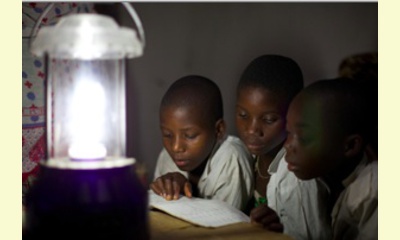|
|
Mothers Light Up Homes in Rural Tanzania
un article par Inter Press Service [reprinted by permission and abridged]
“My mother used to just stay at home, now she has come back and
is an engineer and a leader. She is on the Village Energy
Committee,” said a 10-year-old girl from the village of Chekeleni,
in Tanzania’s southeastern Mtwara district. 
Children study in the evening thanks to a solar-powered lantern in the village of Chekeleni, southern Tanzania. Credit: Ben Langdon/VSO
click on photo to enlarge
Arafa Mwamba is a solar engineer in Chekeleni village, near Mtwara,
Tanzania.Arafa trained as part of the innovative Barefoot Solar
project which enables women from the poorest communities in
rural Tanzania to run successful businesses by installing, repairing
and maintaining solar equipment for their communities and
beyond.VSO volunteer Lesley Reader project manages the scheme
by liaising with the Tanzanian government, Barefoot college and the
Indian government.
“When I grow up I will also be a leader. Maybe I will be the
president,” she said.
Just over a year ago, homes in the village of Chekeleni were dark
after sunset. Today they are filled with light from solar lamps as
women bustle around cooking and children do their homework near
the glowing lamps. At least 200 households now have their own
solar installations for lighting and other electrical needs.
Six women have brought this light to three remote southern
Tanzanian villages in the Mtwara and Lindi districts. They are
among the 25 illiterate, rural mothers, many of them also
grandmothers, from four African countries who were trained at the
Barefoot College in Tilonia in the northwestern Indian state of
Rajasthan, to install and maintain solar energy panels.
The programme was part of the 2011 ‘Rural Women Light up Africa’
initiative, a partnership between UN Women and the Barefoot
College.
After six months the trainees graduate as Barefoot Solar Engineers
and return to their villages to electrify households with solar
lighting units and assume responsibility for their repair and
maintenance for a period of five years.
“We hope this will be a challenge to other women who want changes
and want to eradicate poverty,” said Mariam Luwongo, one of the
engineers from the southern village of Nitekela.
These women not only bring electricity to their communities for the
first time, but they also introduce a renewable and sustainable
source of energy that can be maintained and replicated in other
communities.
Despite being illiterate, of modest means and having never travelled
outside Tanzania, within weeks of returning home, the six
engineers have managed to set up a solar electricity system for the
three small villages of Chekeleni, Nitekela and Mjimwema, in
southern Tanzania, close to the Mozambique border.
Equipment is currently being procured locally to ensure that the
entire community can benefit from their own solar system. . .
Another positive impact of the lighting project has been the
increase in women’s voice and independence. At least four of the
nine members of the Village Energy Committees are women and in
Nitekela the committee chair is also a woman. Financial, leadership
and governance training is enabling them to plan and lead
effectively, while simultaneously working towards sustainability. . .
[Thank you to Janet Hudgins, the CPNN reporter for this article.]
|








|
DISCUSSION
Question(s) liée(s) à cet article:
Do women have a special role to play in sustainable development?,
* * * * *
Commentaire le plus récent:
This discussion question applies to the following articles:
Dublin: Women central to sustainable future development
Calling women: Why women and technology are a perfect pairing
Indigenous women from Canada and the Global South unite at the UN Permanent Forum on Indigenous Rights
Mothers Light Up Homes in Rural Tanzania
Bali summit: Are women our best hope for fighting climate change?
U.N. Climate Talks Advance Link Between Gender and Climate Change
Women Revolutionise Waste Management on Nicaraguan Island
On remote Philippine island, female forest rangers are a force to be reckoned with

|
|









